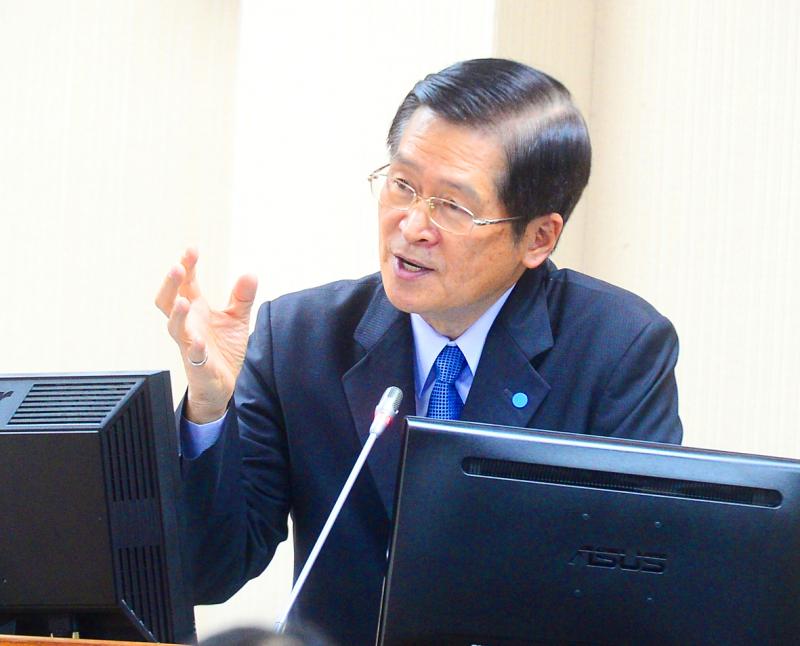The Ministry of National Defense yesterday announced the establishment of a defense mobilization agency to increase the combat preparedness of the nation’s reservists.
President Tsai Ing-wen (蔡英文) in June had said that the nation’s reservists would play a more important role in national defense.
Minister of National Defense Yen De-fa (嚴德發) told lawmakers that there had been 1,710 and 1,029 incidences of Chinese planes and ships respectively having crossed into the nation’s air defense identification zone so far this year.

Photo: Wang Yi-sung, Taipei Times
Chinese planes had crossed the median line of the Taiwan Strait 49 times so far this year, the highest number in 30 years, Yen said.
In view of the increased Chinese provocation, the ministry has proposed reforming the nation’s reservist forces in terms of administrative and unit-level organizations, training and equipment, Yen told lawmakers.
Administratively, all reservists would fall under a defense mobilization agency that would be established in January 2022 and is expected to cost NT$8.9 billion (US$307.3 million), he said.
The agency would outrank the current General Mobilization Office and would have 150 staff, up from 30, he added.
At the unit level, the Armed Forces Reserves centers in 18 cities and counties would answer to whichever combat area command centers they are closest to, Yen said.
In addition, reservist brigades would be expanded from seven to 12, further enhancing their combat strength, he said.
Reservists would be issued with the equipment used by standing forces and training would be enacted yearly instead of biennially, each exercise lasting for two weeks, Yen said, adding that the number of recalled reservists would be increased to 260,000 from 120,000.
General Mobilization Office Director Han Kang-ming (韓岡明) said that the daily wages for reservists being recalled for training would be increased by between 1.2 and 1.5 times.
The ministry would need to construct additional facilities due to the increased number of reservists who would be recalled for training, Yen said.
The nation has no plans to return to conscription, Yen said, adding that the volunteer service would produce older, but better-quality troops.
“We would adhere to a policy of having a minimal, highly trained standing force, with a greater number of reservists able to be mobilized,” he said.
The ministry expects the armed forces to be only 10 percent understrength by the end of this year, demonstrating that the military has not been affected by the COVID-19 pandemic, is unfazed by Chinese provocations and that there remains a willingness for young people to join the military, Yen said.

MAKING WAVES: China’s maritime militia could become a nontraditional threat in war, clogging up shipping lanes to prevent US or Japanese intervention, a report said About 1,900 Chinese ships flying flags of convenience and fishing vessels that participated in China’s military exercises around Taiwan last month and in January have been listed for monitoring, Coast Guard Administration (CGA) Deputy Director-General Hsieh Ching-chin (謝慶欽) said yesterday. Following amendments to the Commercial Port Act (商港法) and the Law of Ships (船舶法) last month, the CGA can designate possible berthing areas or deny ports of call for vessels suspected of loitering around areas where undersea cables can be accessed, Oceans Affairs Council Minister Kuan Bi-ling (管碧玲) said. The list of suspected ships, originally 300, had risen to about 1,900 as

DAREDEVIL: Honnold said it had always been a dream of his to climb Taipei 101, while a Netflix producer said the skyscraper was ‘a real icon of this country’ US climber Alex Honnold yesterday took on Taiwan’s tallest building, becoming the first person to scale Taipei 101 without a rope, harness or safety net. Hundreds of spectators gathered at the base of the 101-story skyscraper to watch Honnold, 40, embark on his daredevil feat, which was also broadcast live on Netflix. Dressed in a red T-shirt and yellow custom-made climbing shoes, Honnold swiftly moved up the southeast face of the glass and steel building. At one point, he stepped onto a platform midway up to wave down at fans and onlookers who were taking photos. People watching from inside

Japan’s strategic alliance with the US would collapse if Tokyo were to turn away from a conflict in Taiwan, Japanese Prime Minister Sanae Takaichi said yesterday, but distanced herself from previous comments that suggested a possible military response in such an event. Takaichi expressed her latest views on a nationally broadcast TV program late on Monday, where an opposition party leader criticized her for igniting tensions with China with the earlier remarks. Ties between Japan and China have sunk to the worst level in years after Takaichi said in November that a hypothetical Chinese attack on Taiwan could bring about a Japanese

The WHO ignored early COVID-19 warnings from Taiwan, US Deputy Secretary of Health and Human Services Jim O’Neill said on Friday, as part of justification for Washington withdrawing from the global health body. US Secretary of State Marco Rubio on Thursday said that the US was pulling out of the UN agency, as it failed to fulfill its responsibilities during the COVID-19 pandemic. The WHO “ignored early COVID warnings from Taiwan in 2019 by pretending Taiwan did not exist, O’Neill wrote on X on Friday, Taiwan time. “It ignored rigorous science and promoted lockdowns.” The US will “continue international coordination on infectious